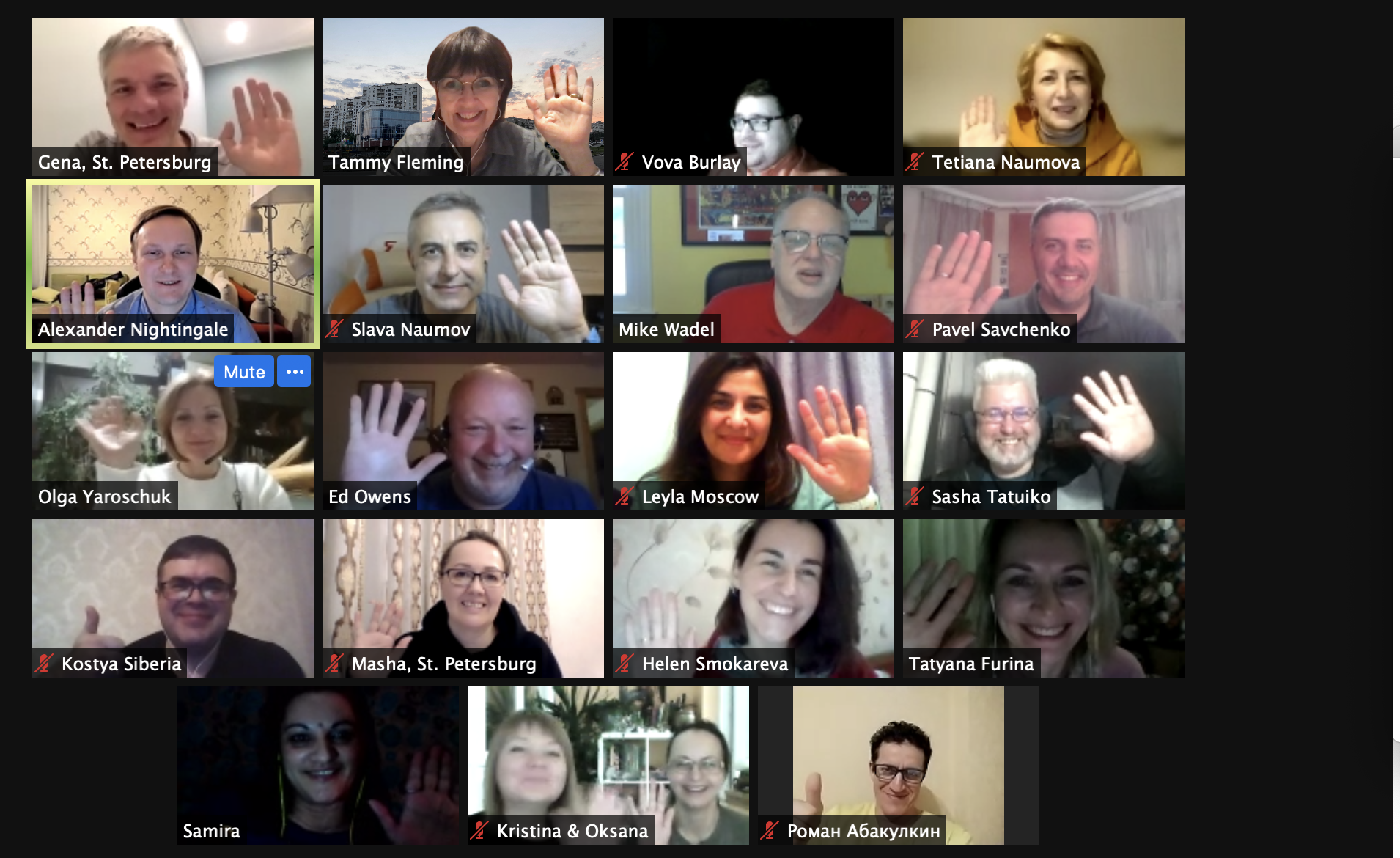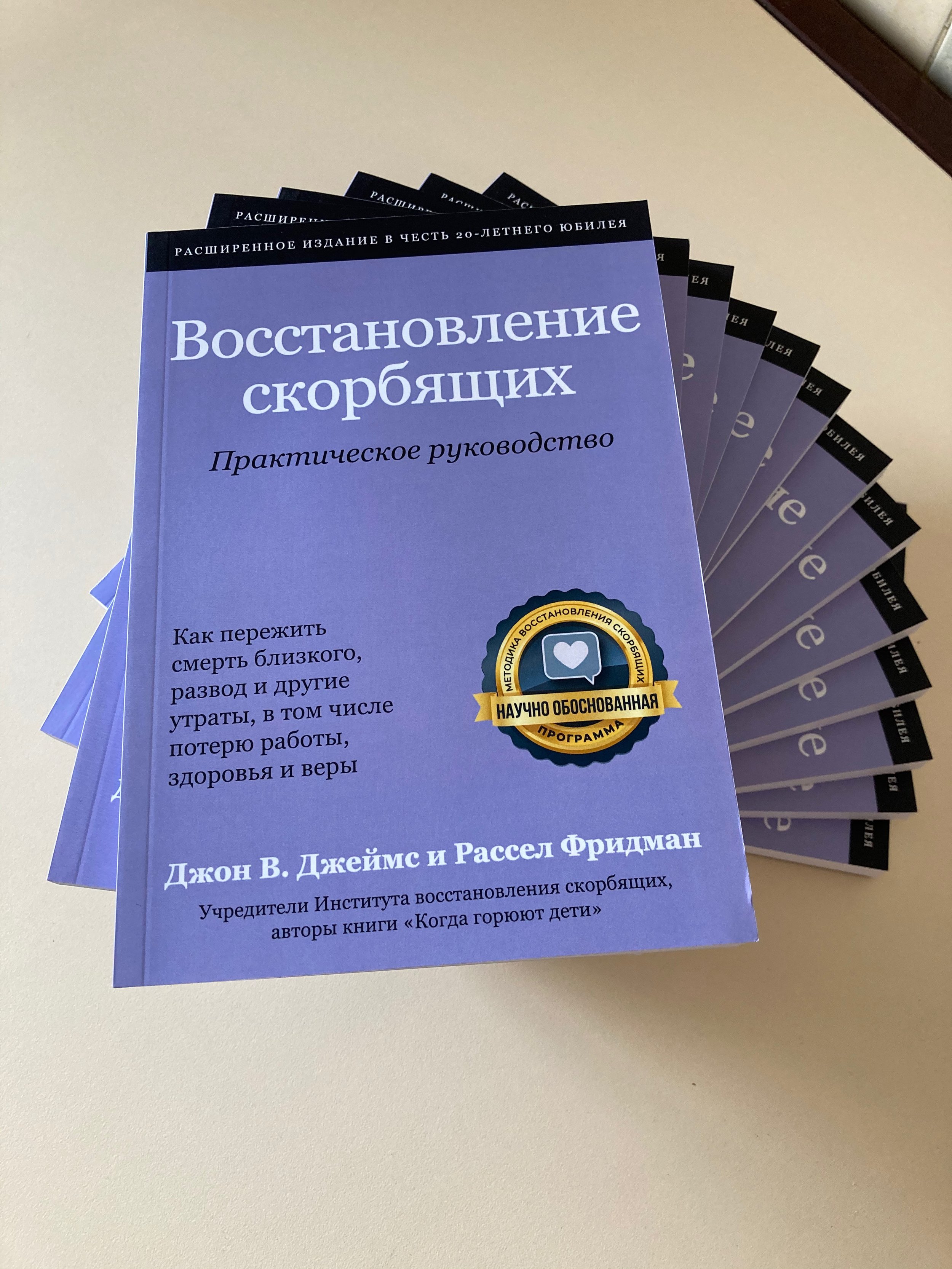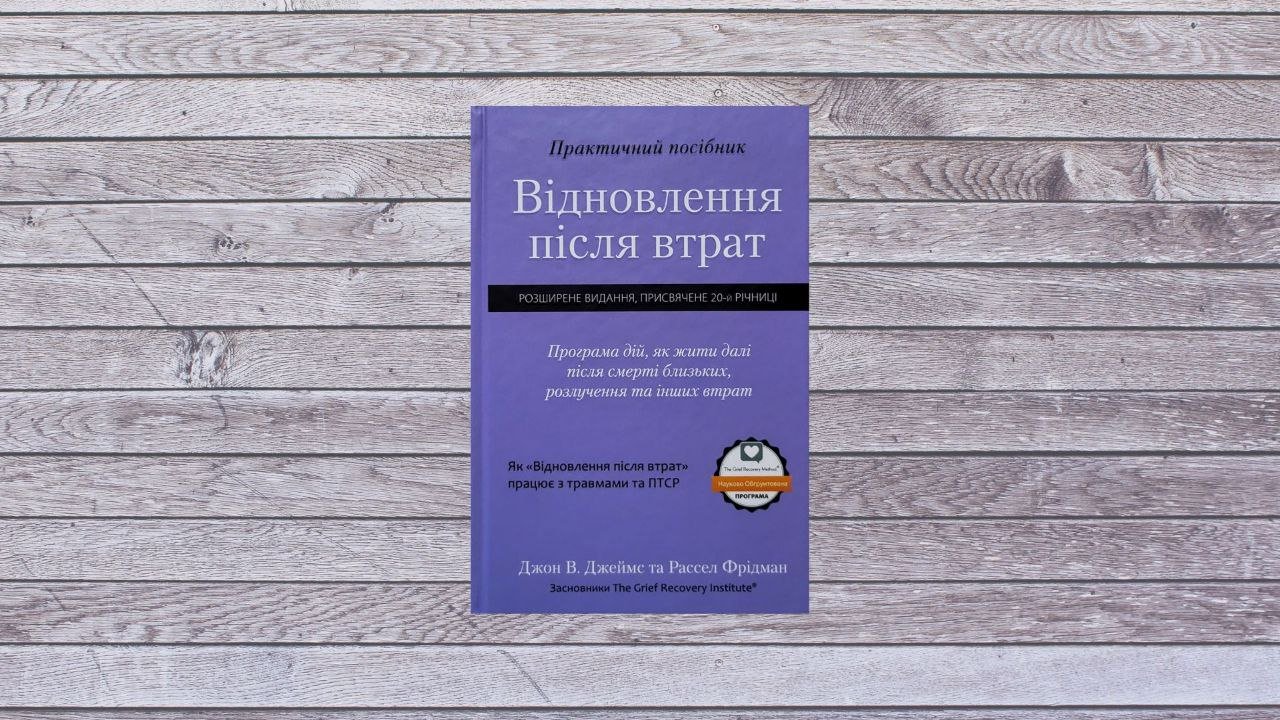My Personal History
We completed the Russian translation (r) in 2021; the Ukrainian translation (l) in 2024.
I had heard of Grief Recovery and the Grief Recovery Method® and the Grief Recovery Institute® for years -- first, through Specialists who worked with our church on the Westside of Los Angeles, and, later, through Teresa Ferguson, a dear friend and a (slightly!) older woman of great faith, whom I have long loved and respected. I think she recommended The Grief Recovery Handbook to me three times before I finally went and bought it and read it. I was riveted. I knew right away that I had something very special in my hands: the life's work of sincerely dedicated professionals, who had seen fit to focus their careers as therapists on people with broken hearts. Their fresh insights about how little most of us are taught about how to deal with grief and loss, their astute and concise explanations about complicated emotions, their simple and practical tools, blew me away.
It was 2007 when I first picked up The Grief Recovery Handbook. I had just made an international move -- from Los Angeles, California, to Birmingham, England. It was my fifth trans-Atlantic move. My husband and I have always loved England (our daughter was born there, between Trans-Atlantic-Moves One and Two, in 1989), and we had decided to return to take a post with a church made up of great-hearted people who had experienced a lot of trauma, both as individuals and as a group. As we settled in, and I began listening to people's stories about their lives and their faith and their friends and families and hopes and dreams, there was so much disappointment...disillusionment...sadness... regret...hurt...so much loss. That word resonated as the best description for the many varied reasons for sadness and disappointment in different people's stories. I, of course, was feeling sad myself, having moved away (again) from my home country and culture and friends and house and the beach and the ocean and T-ball...and so on.
A dear friend and I decided to take a weekend retreat and go through The Grief Recovery Handbook together and do the exercises with one another. We made a reservation at a hotel in the country. We went off, each to our own private place to sit and read and do our homework for each exercise in the book, and then we came back together for meals, to share our private reflections with one another, to be witnesses for one another and listen to one another, as the book instructs.
I had thought that my most acute need was going to be to process the ocean of emotions stirred up and connected to my recent move. To my great surprise, as I began working through the exercises in the book, I realized that there was something deeper and much more pressing that was bringing a lump to my throat and tears to my eyes, as I read and worked through the first exercises in the book. My daughter had just moved out and gone to University. It had not occurred to me that my relationship with her could be the biggest source of sadness in my life at that time, because there were so many things in our relationship that were actually good right at that point!
I hadn’t learned yet that grief is about conflicting emotions. Since there were good things in my relationship with my daughter that I could focus on, I chose to do that, and to avoid and ignore whatever was painful. That might sound like a reasonable strategy, maybe even a noble or spiritually sound one. That’s pretty much how I dealt with anything difficult my whole life. It has a couple of fatal flaws, though: first of all, it’s not honest; and second, it doesn’t take into account the fact that grief is cumulative. It piles up. It seeps into current relationships like an invisible virus. If we don’t pay attention to it and learn to do some personal work to deal with it, it will eventually cause an explosion or an implosion.
One of the things I love about the Grief Recovery Method® is its ability to bring what is hidden in darkness out into the light, where it can stop being so scary, or so heavy, or so energy-sapping, even on a subconscious level. As a young person and a young adult, especially, I expended so much energy on trying to cover up my mistakes and imperfections. I am still in the process of discovering how that strong impulse became ingrained in me — the need to appear better than I really am. In the past, I would not admit mistakes -- often not even to myself. I ended up losing touch with my authentic self that way, of course, and missed out on a lot of personal development. Suffice it to say that I had developed a habit of staying out of whatever kind of light that would reveal my regrets or hurts or fears or heartaches. I did my best to hide them deep down, really well, focusing as much as possible on the positive.
That weekend at the hotel in the country with my friend and The Grief Recovery Handbook, I made the unexpected decision to explore through the exercises in the Handbook my relationship with my daughter — not on that overwhelmingly-looming ocean of emotion related to my recent move. I discovered that I had some deep regrets about my daughter's childhood; things I needed to forgive myself for; things that I wish could have been different, or better, or more. I was shocked to discover that much of the pain I was now acknowledging in that relationship was due to my not being emotionally present for my daughter through a lot of her childhood. I spent so much time worrying about things — yesterday’s unpleasant conversations, tasks I failed to do well, tomorrow’s plans and circumstances beyond my control — that I missed opportunities to build the kind of relationship with her that I always imagined I would have with my daughter.
It was revolutionary.
I started giving The Grief Recovery Handbook away as gifts to friends, left and right. I could no longer “unsee” the profound truth that every breathing soul has a need to learn to grieve well — to learn the skills to be able to complete the many different kinds of losses that are normal and natural in every human life, including those that may come with trauma, tragedy, and violence.
After that initial experience, though I recommended the Grief Recovery Method® to dozens of people, I didn’t turn to it again for myself for another ten years. It had not occurred to me that I might have several more very significant incomplete relationships in my life that were adversely affecting my quality of life in ways I did not appreciate at the time.
In 2016-17, I took a sabbatical year off in the USA and decided to devote myself to exploring all the many programs and courses available that deal with grief and loss. I went to weekend seminars and interviewed creators of various programs, exposing myself to everything I could find. At the end of that year, I felt that everything I had experienced was positive and encouraging, but I discovered nothing comparable to the Grief Recovery Method®. It was the only evidence-based grief support program I encountered. It had a clear beginning and a clear ending. It taught specific actions to take that actually work, a toolbox that participants could take away with them and use whenever needed. And it was not culture-bound nor faith-based, so it could be translated into Russian and taken successfully into that environment, which was another goal that I had for my research at the time.
The timing of all this as I look back, is just incredible. I did my Foundational Certification Training in the Grief Recovery Method® in 2017 (thank you, Laura Jack). I worked on my relationship with my 19-year-old son during that weekend training, and only upon completing that relationship did the realization dawn on me, that all of the angst I had been experiencing with my son was probably due to unfinished business between myself and my parents. I quickly went to work and completed my relationships first with my mother and then with my father. Each one of those experiences was life-changing! Shortly after that I joined one of the first waves of the Online Capabilities Training (then known as the Advanced Online Specialist Training) and was already engaged in translating all the GRM course materials into Russian. I was in the Russian Federation, Belarus and Ukraine for most of 2017-2020 and in that time was able to take 233 native Russian-speakers through the Grief Recovery Method® as we were working on the translation.
2020 of course brought the Covid lockdowns all over the world. I spent that time learning to become a Grief Recovery Method® Specialist Trainer myself and continued to oversee the translation project. In May 2021 we arranged for Ed Owens, Vice President of the Grief Recovery Institute in the USA, along with Mike Wadel, to train 15 native Russian-Speaking Grief Recovery Method® Specialists in seven cities and five nations from Vladivostok to Minsk.
What happened next? The door to Russia slammed shut. War erupted between Russian and Ukraine on February 24th, 2022. At that point we had a total of 17 trained Grief Recovery Method® Specialists already in place on both sides of the frontline of the war.
We have been incredibly well-positioned to offer effective emotional support to meet all the heartbreaking needs we now face in this part of the world.
The war has brought with it so many heartbreaking new realities. Eight million displaced Ukrainians, all dealing with trauma and losses of many kinds — loss of safety, loss of identity, loss of language and culture, loss of family, security, loss of life, loss of health and mobility, loss of hope…the list is so long. Cities have been leveled, “peace” and “home” have been stolen, families are broken apart.
It has also presented us with new opportunities. Our Ukrainian Grief Recovery Method® Specialists, even while having to evacuate their homes at the beginning of the war, have bravely forged ahead, delivering the program to grievers, fund-raising, becoming active raising awareness about the Grief Recovery Method® on social media, and completing a new translation of The Grief Recovery Handbook and all its accompanying course materials into Ukrainian. Thanks to many friends, colleagues and other generous supporters who donated to our Go Fund Me campaign. The official Ukrainian title of the Handbook is Відновлення після втрат. You can purchase it here.
Meanwhile, in August 2023, the same team that produced the Russian translation of The Grief Recovery Handbook released the Russian translation of When Children Grieve, by John James, Russell Friedman, and Dr. Leslie Landon Matthews.
Currently, in addition to overseeing the ongoing translation work for these programs in Russian and Ukrainian and continuing to provide support for our Russian-speaking and Ukrainian-speaking Specialists in Eastern Europe and Eurasia, I am enjoying the chance to deliver the program in English on a more regular basis to online groups. I’ve continued to do the work for myself as well. Since going through the Grief Recovery Method® for the first time back in 2007, I’ve walked this same path to completion with thirteen of my most significant relationships and I can see that I still have more to do. Right now I’m going back and walking the path of this personal work for my relationship with my father for the second time. I discovered this year — at the age of 64 — that my father who raised me (0 to 10 years old) is not my father! An unidentified sperm donor was my biological father.
What difference does doing this work make? Since learning the skills and tools of grief recovery, I have a much-improved quality of life and overall well-being. My thoughts don’t accuse me and assault me like they used to. I don’t pack my schedule with an insane level of activity like I used to. I don’t fear constructive criticism like I used to. I have become noticeably less “offend-able” or “trigger-able.” I am not as afraid of other people’s negative emotions like I used to be. I no longer feel automatically responsible for other people’s pain like I used to. Maybe one of the greatest benefits has been a much deeper humility about the fact that at any given moment, I have no idea about how much more I don’t know.
Want to hear more, or have questions? I hope you’ll feel free to send me a message at tammy@missionstory.com.
I’d love to invite you to visit my YouTube Grief Recovery Method® playlist. I also have one on grief recovery principles for Christian believers; and there are similar playlists in Russian, Методика восстановления скорбящих and восстановление скорбящих для верующих. Coming soon in Ukrainian!








